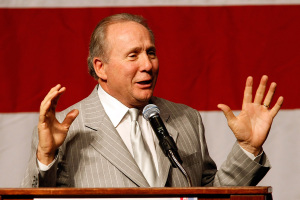Pence calls Trump's actions on Jan. 6 'reckless' as GOP ponders different path in 2024

Ahead of former President Donald Trump's expected announcement of a third presidential bid Tuesday, former Vice President Mike Pence is calling Trump's actions leading up to the Jan. 6, 2021, U.S. Capitol riot "reckless" as he and many Republican primary voters are implying that the party should go in a different direction in 2024.
In an interview with ABC News's David Muir that aired Monday, Pence discussed what happened on Jan. 6, when a group of Trump supporters stormed the U.S. Capitol as Congress counted the electoral votes from the 2020 presidential election.
Pence, who was there to certify the count, recalled a conversation he had with the president that morning, where he told the president he doesn't "have the authority to reject votes during the electoral count and return those votes to the states."
Amid concerns about voter fraud, Trump insisted that the vice president had the authority to unilaterally reject electoral votes from states if enough people raised questions about the authenticity of the vote, an idea that Pence steadfastly rejected during his conversation with the president.
"It went downhill from there," Pence said. "The president became very irate on the phone. He said that if that was true, then he made a mistake five years ago.'"
Pence's interview with Muir came ahead of the release of Pence's memoir titled So Help Me God. Muir read an excerpt from the book in which Pence insisted that the former president told him that he would "go down as a wimp" if he did not reject the electoral college votes from certain states.
When asked by Muir what he thought of the fact that "the president was aware that people in that crowd, that some of them might have been armed" and urged them to "march to the Capitol" anyway, Pence responded, "the president's words were reckless, and his actions were reckless."
"The president's words that day at the rally endangered me, my family and everyone at the Capitol," Pence stressed.
Pence reiterated his characterization of Trump's words as "reckless" after Muir read aloud one of the president's tweets from the afternoon of Jan. 6, asserting that "Mike Pence didn't have the courage to do what should have been done." Muir suggested that Trump's tweet led to a "response from rioters on the Hill" as footage of protesters chanting "hang Mike Pence" played onscreen.
After Muir noted that Pence spoke with many members of the administration on Jan. 6, he asked, "at any point on that day, on Jan. 6, as that was unfolding, did the president reach out to talk to you to ask you how were you doing, to check on your safety?" Pence replied: "I never heard from the president or the White House that day."
The interview concluded with a question about Trump's expected announcement of a third presidential campaign Tuesday evening, specifically asking: "Do you believe Donald Trump should ever be president again?" Pence insisted that such a question was "up to the American people," while predicting that "we'll have better choices in the future."
"The people of this country actually get along pretty well once you get out of politics, and I think they want to see their national leaders reflect that same compassion for the generosity of spirit," he added. Pence said he and his family would give "prayerful consideration" to the idea of a White House bid in 2024 even if it means running against the man he served alongside for four years.
Pence is not the only person to indicate that the Republican Party should go in a different direction after last week's midterm election yielded results widely viewed as a disappointment for Republicans, who hoped to make large gains in both houses of the U.S. Congress as is customary in midterm elections.
With the outcome of one U.S. Senate race undecided, Democrats are guaranteed at least a 50-50 majority in the upper chamber.
Should Democrats win the Dec. 6 runoff election in Georgia, they will have a 51-49 majority. Democrats will have a 50-50 majority if Republicans win the last undecided election with Vice President Kamala Harris casting the tie-breaking vote in favor of the Democrats. With several races undecided, Republicans are on track to take a narrow majority in the U.S. House of Representatives.
Dueling narratives have emerged as to why Republicans underperformed, with one line of thinking laying the blame at the feet of Trump for endorsing candidates in the Republican primary that were unelectable in the general election and another suggesting that Senate Majority Leader Mitch McConnell did not provide GOP candidates in swing states with the resources they needed to take on well-funded Democratic incumbents.
Polling conducted in the week since the election shows Republican primary voters warming to the idea of supporting Florida Gov. Ron DeSantis over the former president, reflecting the fact that DeSantis won re-election by nearly 20 points in a state Trump carried by less than four points two years earlier on a night when Republicans did not make the significant gains they expected.
According to a survey conducted by YouGov from Nov. 9-11, 42% of Republican primary voters want DeSantis to be the Republican nominee for president in 2024, as opposed to 35% who prefer Trump.
A poll conducted from Nov. 11-13 by WPA Intelligence and the Club for Growth found DeSantis beating Trump in head-to-head matchups in hypothetical Republican primaries in four states.
In Iowa, the first state to hold a Republican caucus in a presidential election year, DeSantis leads Trump 48% to 37%. The poll of likely New Hampshire Republican primary voters shows DeSantis leading Trump 52% to 37%. In both Trump and DeSantis' home state of Florida, DeSantis has 56% support compared to Trump's 30%. The poll's survey of likely Georgia Republican primary voters measures DeSantis' support at 55% and Trump's at 35%.
Although DeSantis is widely seen as a 2024 presidential contender, he has yet to explicitly express interest in the job or formally throw his hat into the ring.
Ryan Foley is a reporter for The Christian Post. He can be reached at: ryan.foley@christianpost.com



























